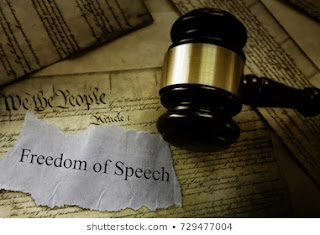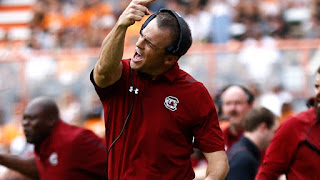The Coby Cornelius vs. Jim Baxter Twitter exchange: A lesson in free speech
July 4th in the United States has passed, and the usual pomp and circumstance of cookouts, get-togethers and overall admiration for the founding of the country cappedy by fireworks the following days after went relatively fine.
But in the SC high school sports Twitterverse (because that is a thing) a major discussion attempted to take place between Jim Baxter, who runs SC Varsity, and Coby Cornelius, a rising senior football player at Spring Valley in Columbia, SC.
In short, what could have been was a generational-crossing discussion between two people with two very different perspectives and life experiences, and how it helped shape their views, and, possibly, lead to personal growth for both, and those witnessing it.
What happened was one man resorting to simplistic talking points, and an excercise in the freedom of speech and how it relates to consequence-free speech ensued.
In short, Baxter posted a harmless, love the founders type post typical on the day.
Cornelius then posted the below in a response.
Backstabbing and conquering Native Americans, forcing their population to dwindle. As well as setting America up for the imprisonment of African American men, women, & children through a system of slavery and oppression that would cause problems for centuries to come. https://t.co/aPXrOywf7y
— Coby Cornelius 🔇 (@CobyCornelius) July 4, 2020
What ensued was in a screen grab below, because Baxter has since switched his profile to private.
Telling this to a high schooler after he voiced his opinion respectfully, smh. @SCVarsity just loves to hear himself talk and needs to be a humbled some. I told y’all boys, this man been a clown since we was at the high🤦🏾♂️ @trudolph4 @JamalM_61 @regg5oh4 pic.twitter.com/bxSHxhu9Ji
— Jay😈🖤 (@_jrice16) July 4, 2020
If you can't read the screen grab, the response was the typical "If you hate America so much, leave."
Nevermind this is a neanderthalic response used as a crutch by those who don't typically have much to defend a position, telling anyone to go back to where they came from is pig-headed at best, and bigoted and zenophobic at worst.
To be clear, I don't know if Baxter is a racist. But his comments paint him in that way, whether intentional or not.
On the other side, what Cornelius said can be taken as incidiary by some, but what he said his rooted in historical fact. Was July 4th the right day to bring this up? I can't say for sure.
When is it the right time to talk about the more sordid parts of the country's history? July 3? July 5? September 18 at 4:45 p.m.?
But the other part of this story is what happened the folowing days. Nearly immediately, players and coaches from Spring Valley and other area high schools backed Cornelius, and coaches began blackballing Baxter from their campuses.
Joining the list of people unaffiliating with SC Varsity was the Fox affiliate in Columbia, as well as WNKT, the sports talk station in Columbia.
On the heels of these decisions came questions of "What happened to freedom of speech in this country?"
Surprisingly, this is the second time in two months this has been raised in the Palmetto State.
In June, during the height of the Black Lives Matter protest after the murder of George Flloyd at the hands of Minneapolis law enforcemen, Tanner's Big Orange, a restaraunt in Greenville, was in the news for a post its owner made against the Black Lives Matter movement.
The same argument came up: "What about his first amendment right?"
Two different scenarios both encapsulate the same thing: The scope of free speech.
The first amendment reads simply, "Congress shall make no law respecting an establishment of religion, or prohibiting the free exercise thereof; or abridging the freedom of speech, or of the press; or the right of the people peaceably to assemble, and to petition the Government for a redress of grievances."
In its simplest terms, the amendment protects individuals from government infringement. Neither gentlemen in these instances lost their businesses, were arrested, or faced in penalty of law for what they wrote/said.
Freedom of speech and consequence-free speech are two different concepts, and both of these instances are examples of the latter.
Both men voiced freely what they were feeling, and those who heard/read what was said voiced theirs in either discourse (in the case of Cornelius), or protest (Tanner's Big Orange).
Free speech does not absolve us from consequence of that speech. If you voice an opinion, you must be prepared for the consequences of that action. If a business, such as a radio or television statue, decide to disassociate from a person after voicing an opinion, that is that businesses right.
If people want to protest and boycott a restaraunt for opinions they don't agree with, that is those people's right.
Simply put, a throwaway line of dialogue from "Inherit the Wind" speaks volumes.
I'll set the scene, two men walk through a carnival atmosphere on the heels of the start of the Scopes Monkey Trial (the teaching of evolution vs. creationism in the classroom) and spot a hot dog vendor. A gentleman asks the vendor, "What do you think of all this evolution business?" The vendor replies, "Got no opinion sir. Opinions are bad for business."




Comments
Post a Comment